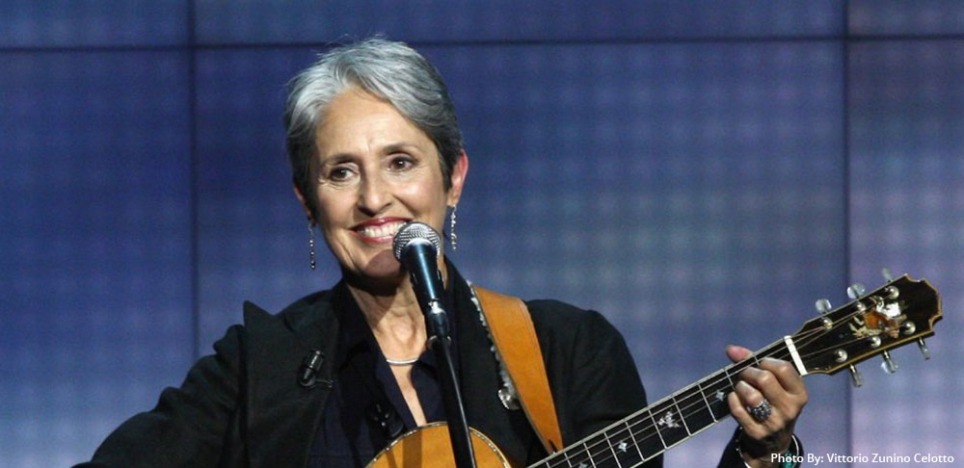Through benefit concerts and civil disobedience over the course of decades, renowned folksinger and songwriter Joan Baez has brought her influence to bear on issues of free speech, opposition to the Vietnam War and other military engagements of the United States, LGBT rights, desegregated schools, rights of farm workers, abolition of the death penalty, and the nuclear freeze movement. She persists in practicing civil disobedience and has faced legal challenges for following her conscience.
In 1941, Baez was born in New York City to a Methodist family. When she was still a young child, they became Quakers, kindling her ardent dedication to pacifism and social causes. Her Mexican heritage made her the brunt of discrimination when she was growing up, helping her understand prejudice from the inside out. She got involved in nonviolent social action beginning in her high school years, after hearing Dr. Martin Luther King, Jr. speak. She marched on the front lines of the Civil Rights Movement in Alabama and Mississippi.
As a singer, Baez first became known for the penetrating clarity of her voice and message while performing at the 1959 Newport Folk Festival. She went on during the 1960s to transform traditional ballads into the rock vernacular. In 1963, she unselfconsciously introduced then little-known Bob Dylan to the world. She was emulated by world-class musicians like Judy Collins, Joni Mitchell, and Bonnie Raitt.
In 1979, Baez founded Humanitas International Human Rights Committee; she served as its leader for 13 years. She has received seven grammy nominations and, at the 2007 Grammy Awards, was given a Lifetime Achievement Award from the National Academy of Recording Arts and Sciences. In 2011, Amnesty International bestowed on her the inaugural Joan Baez Award for Outstanding Inspirational Service in the Global Fight for Human Rights. She will be inducted into the Rock and Roll Hall of Fame on April 7, 2017. You can learn more about her music and her extensive accomplishments at the Joan Baez website.
To Name this Day:
 Quotes
Quotes
"Action is the antidote to despair."
"I went to jail for 11 days for disturbing the peace; I was trying to disturb the war."
"Only you and I can help the sun rise each coming morning. If we don't, it may drench itself out in sorrow. You special, miraculous, unrepeatable, fragile, fearful, tender, lost, sparkling ruby emerald jewel, rainbow splendor person. It's up to you."
 Spiritual Practices
Spiritual Practices
Listen to Joan Baez's rendition of "We Shall Overcome" at the 1963 March on Washington for civil rights:
Consider today what's most important to you to overcome — in your own life and for the sake of others. What is your next step in being unafraid to act and making this vision a reality?
